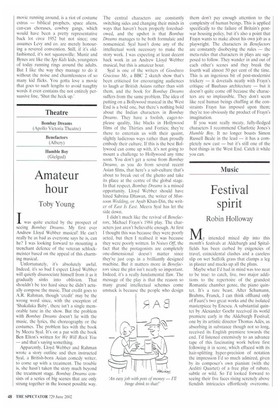Amateur hour
Toby Young
Iwas quite excited by the prospect of seeing Bombay Dreams. My first ever Andrew Lloyd Webber musical! He can't really he as bad as everyone says he is, can he? I was looking forward to mounting a trenchant defence of the veteran schlockmeister based on the appeal of this charming musical.
Unfortunately, it's absolutely awful. Indeed, it's so bad I expect Lloyd Webber will quietly disassociate himself from it as it gradually sinks into oblivion. That shouldn't he too hard since he didn't actually compose the music. That credit goes to A.R. Rahman, though 'credit' may be the wrong word since, with the exception of 'Shakalaka Baby', there isn't a single memorable tune in the show. But the problem with Bombay Dreams doesn't lie with the music, the lyrics, the choreography or the costumes. The problem lies with the book by Meera Syal. It's on a par with the book Ben Elton's written for We Will Rock You — and that's saying something.
Apparently, Lloyd Webber and Rahman wrote a story outline and then instructed Syal, a British-born Asian comedy writer, to come up with a treatment. The trouble is, she hasn't taken the story much beyond the treatment stage. Bombay Dreams consists of a series of big scenes that are only strung together in the loosest possible way.
The central characters are constantly switching sides and changing their minds in ways that haven't been properly foreshadowed, and the upshot is that Bombay Dreams manages to be both formulaic and nonsensical. Syal hasn't done any of the intellectual work necessary to make the story work. I was expecting at least decent hack work in an Andrew Lloyd Webber musical, but this is amateur hour.
Syal is one of the writers of Goodness Gracious Me, a BBC 2 sketch show that's been criticised for encouraging audiences to laugh at British Asians rather than with them, and the book for Bombay Dreams suffers from the same problem. The idea of putting on a Bollywood musical in the West End is a bold one, but there's nothing bold about the Indian characters in Bombay Dreams. They have a foolish, eager-toplease quality, like blacks in Hollywood films of the Thirties and Forties; they're there to entertain us with their quaint, slightly ludicrous ways rather than proudly embody their culture. If this is the best Bollywood can come up with, it's not going to mount a challenge to Hollywood any time soon. You don't get a sense from Bombay Dreams, as you do from several recent Asian films, that here's a sub-culture that's about to break out of the ghetto and take its place at the centre of the global stage. In that respect, Bombay Dreams is a missed opportunity. Lloyd Webber should have hired Sabrina Dhawan, the writer of Monsoon Wedding, or Ayub Khan-Din, the writer of East Is East. Meera Syal has let the side down.
I didn't much like the revival of Benefactors, Michael Frayn's 1984 play. The characters just aren't believable enough. At first I thought this was because they were poorly acted, but then I realised it was because they were poorly written. In Noises Off, the fact that the protagonists are completely one-dimensional doesn't matter since they're just cogs in a brilliantly designed machine. But it matters more in Benefactors since the plot isn't nearly so important. Indeed, it's a really fundamental flaw. The message of the play is that the reason so many grand intellectual schemes come unstuck is because the people who design them don't pay enough attention to the complexity of human beings. This is applied specifically to the failure of Britain's postwar housing policy, but it's also a point that Frayn wants to make about his own job as a playwright. The characters in Benefactors are constantly disobeying the rules — the meta-rules that characters in plays are supposed to follow. They wander in and out of each other's scenes and they break the fourth wall almost 50 per cent of the time. This is an ingenious bit of post-modernist trickery — it dovetails neatly with Frayn's critique of Bauhaus architecture — hut it doesn't quite come off because the characters are so implausible. They don't seem like real human beings chaffing at the constraints Frayn has imposed upon them; they're too obviously the product of Frayn's imagination.
If you want really meaty, fully-fledged characters I recommend Charlotte Jones's Humble Boy. It no longer boasts Simon Russell Beale in the lead — it has a completely new cast — but it's still one of the best things in the West End. Catch it while you can.


































































 Previous page
Previous page